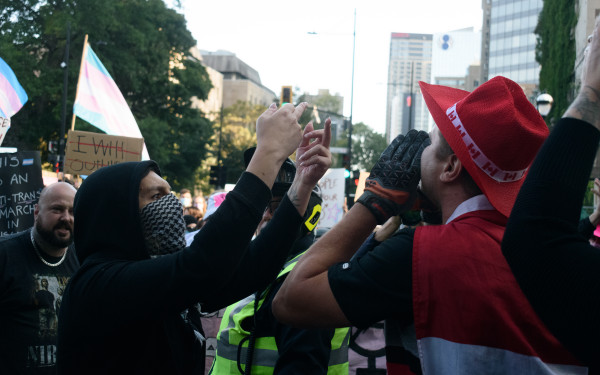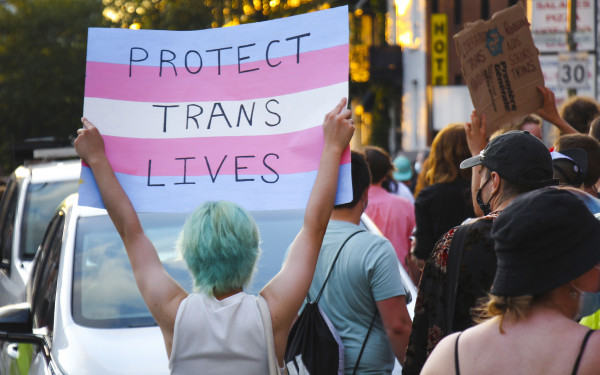Transgender community and allies gather for trans remembrance march
Attendees called for the protection of trans rights on Transgender Day of Remembrance
On the evening of Nov. 20, over 100 transgender people and allies gathered at the George Étienne Cartier monument to commemorate this year’s Transgender Day of Remembrance.
The vigil, spearheaded by trans activist Celeste Trianon, comes as one iteration of a yearly event commemorating members of the community who have lost their lives from transphobia. The first Transgender Day of Remembrance was held in 1999, and was created to avoid forgetting those lost to transphobic violence.
“People have told me the importance of remembering people’s lives, remembering those lost,” Trianon said.
This event comes two months after the pro-trans counter-protest on Sept. 20. Though playing a key role, Trianon was not the sole organizer. “A lot of times when I organize protests, there is this false impression that it’s just me.”
Throughout the event, Trianon spoke about the importance of community and collective action. “If there is one organizer you can pinpoint here, it’s the community.”
Attendee Lucille Sullivan said that due to the stark increase in anti-trans legislation in the United States and Canada, it is “a difficult time for trans people […] [It’s happening] in 49 states, so it’s not just in the south, it’s everywhere.”
Sullivan said that the visibility of holding an event like this was important for those who wouldn’t otherwise interact with the community. “I hope people take a look and maybe see it and if they don’t know a lot about trans people educate themselves.”
“A lot of the time there’s kind of misconceptions. People don’t really know much about trans people and like to spread hateful rhetoric without knowing anything about us,” said Sullivan.
Many volunteers helped contribute to the successful running of the event. Rajendra Kapilabandestio, a cisgender volunteer who acted as a traffic marshall, said that “[he acts] in solidarity with the transgender community.”
“Trans rights are human rights and I think they need to be protected,” he said. “Slowly human rights and trans rights are being eroded throughout the country and we need to protect trans people and trans rights.”
Kapilabandestio said that it was important for him to be there, “to remember the trans activists and trans people who have died in the struggle to secure these fundamental human rights.”
Before speeches began as attendees gathered around the base of the monument and the steps below, organizers encouraged people to take candles and food they had prepared in advance. Concordia group The People’s Potato was handing out carrot and ginger soup, blueberry muffins and tea to attendees.
Trianon addressed the crowd, speaking to the importance of community and the resilience of trans people. She then held a minute of silence to remember those who have passed in the past year before inviting two speakers to join her at the base of the monument.
One organizer read tributes to a few transgender people lost in the past year that had been submitted prior to the event, and another speaker who was with Queers for Palestine (a new organization run through Mumbaadarat, Helem Montréal, and P!nk Bloc Montréal) stepped up to the monument. They spoke about the importance of liberation for all queer people worldwide.
Trianon then instructed the crowd to gather in the street in preparation to march toward La Fontaine Park. The large trans flag was removed from the monument and brought to the crowd, where attendees held on to the edges and carried it between them as they walked.
Chants such as “trans rights are human rights,” “we’re sexy, we’re hot, genocide is not,” “bottoms, tops, we all hate cops,” and “À qui la rue? À nous la rue!” began as the march started and made its way down the streets.
At one point, an attendee’s electric candle was thrown into the trans flag and was bounced around by those flapping their portions to create waves across the surface, resulting in many candles bounding on the surface of the flag.
The group marched from Parc Avenue down Mont-Royal Avenue, where Trianon stopped the group in front of the Mont-Royal metro station and instructed marchers to participate in a die-in, a form of protest where participants occupy an area and pretend to be dead in order to call attention to unjust death caused by social or systemic issues, if they so wished.
Most marchers laid down, and Trianon continued speaking. She condemned transphobic violence and the complacency it was acknowledged with, asking rhetorical questions about how many more trans people must die before systemic issues were acknowledged. “We are not expressing any demands. We are marching first and foremost for ourselves, for the people who need it,” she said.
The group then continued until it reached La Fontaine Park, where Trianon spoke again. “If you have trans people in your lives right now, try and check in on them. The last few months have not been easy for trans people anywhere and I believe it is our civic duty to make sure that they are doing well,” she said.
Trianon closed by thanking everyone for their presence and encouraging attendees to bond with each other.






_600_375_90_s_c1.jpg)
_600_375_s_c1.png)